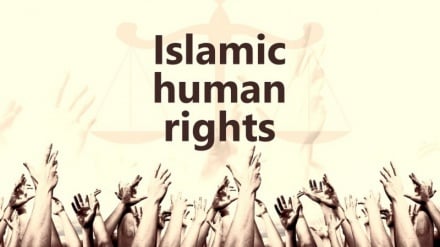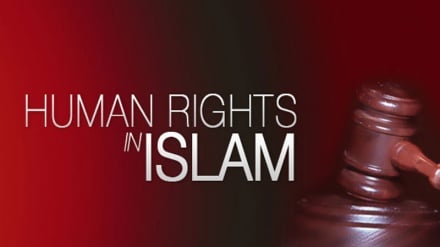Islamic human rights (12)
As a reminder, it was said that in accordance to Islamic teachings, the right to set human rights laws only belongs to God Almighty.
The one and only creator of the universe, God Almighty; via sending prophets and heavenly books, has specified these laws for mankind. From the very first day in which man was created, God presented heavenly books to guide mankind throughout his life. These guide books told mankind where he comes from; where he goes; and how he should cover the righteous path toward God Almighty. Holy Quran, the last and most comprehensive holy book, has been bestowed by God to man; so that upon compliance with Quranic teachings, creation would become meaningful. God has promised man that if he would abide by Quranic teachings, he would gain superiority to all in heavens and earth, while if he places aside Quranic teachings, many other creatures gain superiority to mankind.
The 72nd ayah of Surat al-Ahzab in Holy Quran notes: “Indeed We presented the Trust to the heavens and the earth and the mountains, but they refused to bear it, and were apprehensive of it; but man undertook it. Indeed he is most unfair and senseless.”
Holy Quran divides the global family into three members which are Muslims, non-Muslim monotheists, and atheists. Holy Quran conveys an especial message for all of them and considers a number of rights for them. Even, at the era of prophet hood of Prophet of Islam, Mohammad (Blessings of God upon him and his progeny), God presented two principles for the Prophet of Islam, so that he would administer these three members of the global family with these two principles. The first principle has been stated in the 64th ayah of Surat al-Imran in Holy Quran. This ayah notes: “Say, ‘O People of the Book! Come to a word common between us and you: that we will worship no one but Allah, and that we will not ascribe any partner to Him, and that we will not take each other as lords besides Allah.’ But, if they turn away, say, ‘Be witnesses that we are Muslims.’ ”
One part of this ayah explains the common principle among all monotheists, and the other part details the common principle among all human beings. Although this entire ayah is apparently related to the People of the Book, it sends a message to monotheists not to worship anyone but God and not to ascribe any partner to Him. This ayah calls on the entire mankind, including disbelievers, not to take each other as lords besides Allah.
In regard to the second principle, the 8th ayah of Surat al-Mumtahanah of Holy Quran instructs Muslims to respect the particular rights of the two other members of the global family, which are non-Muslim monotheists, and atheists. This ayah note: “Allah does not forbid you in regard to those who did not make war against you on account of religion and did not expel you from your homes, that you deal with them with kindness and justice. Indeed Allah loves the just.”
In principle, sacred religion of Islam instructs Muslims to respect the global family and only turn their backs on those who have piled up political and social pressure on Muslims. For this reason, in relation to political behavior, Muslims have been taught not to break any pledge and to remain committed to their vows as long as the other party is committed to its pledge. God in the 7th ayah of Surat al-Tawbah of Holy Quran notes: “So long as they are steadfast with you, be steadfast with them.” Also Holy Quran has instructed all Muslims to behave kindly toward all humans.
The 83rd ayah of Surat al-Baqarah in Holy Quran notes: “…and speak kindly to people…”
Among the other ayahs of Holy Quran which call on Muslims to comply with the rights of members of the global family; there is a comprehensive and valuable instruction which has been presented three times in Holy Quran, within the 85th ayah of Surat al-A’raf, 85th ayah of Surat Hud, and 183rd ayah of Surat al-Shu’ara’. This instruction notes: “And do not cheat the people of their goods.”
In order to understand this message, its comprehensiveness should also be taken into consideration. This ayah covers all of the aspects of people’s lives from any creed or race. Overcharging; non-fulfillment of duty in teaching, compiling books, and researching; lack of accuracy in social affairs and the service sector; and negligence in judgment are prime examples of cheating people of their goods. For instance, whenever a Muslim and a disbeliever attend court, the presiding judge is duty-bound to be just toward both of them.
The 58th ayah of Surat al-Nisa in Holy Quran notes: “…and when you judge between people, judge with fairness.”
Islam conveys a message to all members of the global family, which are Muslims, non-Muslim monotheists, and disbelievers. Now, some may imagine that the message that Islam conveys to the world only belongs to the era of the global rule of the Savior of Mankind, the 12th Infallible Imam of the Prophet of Islam’s Household, Imam Mahdi (May God hasten his reappearance). However, the fact is that even during the period of occultation of Imam Mahdi, the sacred religion of Islam has a number of plans and conveys messages to the international community.
We realized that the sacred religion of Islam conveys a number of humanitarian messages to the entire mankind. Man is a creature of God and is superior to other creatures, due to his wisdom, resolve, and sense of responsibility. People are born equal, and maintain no superiority toward others due to their race or ethnicity. In fact, the superiority of some to others is tied to their faith in God, and piety. For this reason, God sent prophets to assist man’s wisdom, and to guide mankind. Moreover, God bestowed heavenly books for mankind to guide him throughout his life. Holy Quran, which is the last and most comprehensive holy book, contains countless messages for the entire mankind. Today, all Muslims are duty-bound to cover the righteous path in order to be able to implement and fulfill Islamic rulings across the globe. The important point is that Muslims should not confront other humans for the purpose of enforcement of Islam rulings. The path which should be covered to fulfill this goal is for Muslims to promote virtues and to prevent vice. This is the approach that Holy Quran introduces to Muslims.
In the 41st ayah of Surat Al-Hajj in Holy Quran, God notes: “Those who, if We granted them power in the land, maintain the prayer, give the zakat, and bid what is right and forbid what is wrong. And with Allah rests the outcome of all matters.”
It is concluded that although sacred religion of Islam respects all of the members of the international community, it has obliged all Muslims to invite the global community toward the righteous path and to make every effort to encourage the members of the global community to convert to sacred religion of Islam.
MR/ME


